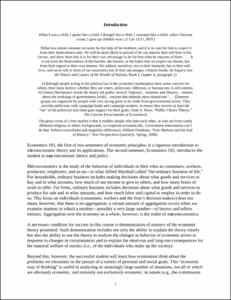Please use this identifier to cite or link to this item:
http://hdl.handle.net/10267/1248Full metadata record
| DC Field | Value | Language |
|---|---|---|
| dc.contributor.author | McMahon, Marshall | - |
| dc.date.accessioned | 2008-02-28T16:26:56Z | - |
| dc.date.available | 2008-02-28T16:26:56Z | - |
| dc.date.issued | 2008-02-28T16:26:56Z | - |
| dc.identifier.uri | http://hdl.handle.net/10267/1248 | - |
| dc.description | This syllabus was submitted to the Rhodes College Office of Academic Affairs by the course instructor. | en_US |
| dc.description.abstract | Economics 101, the first of two semesters of economic principles, is a rigorous introduction to microeconomic theory and its applications. The second semester, Economics 102, introduces the student to macroeconomic theory and policy. Microeconomics is the study of the behavior of individuals in their roles as consumers, workers, producers, employers, and so on—in what Alfred Marshall called “the ordinary business of life.” For households, ordinary business includes making decisions about what goods and services to buy and in what amounts, how much of our income to give to others, and how many hours of work to offer. For firms, ordinary business includes decisions about what goods and services to produce for sale and in what amounts, and how much labor and capital to employ in order to do so. This focus on individuals (consumers, workers and the firm’s decision makers) does not mean, however, that there is no aggregation; a certain amount of aggregation occurs when we examine markets in which a number—possibly a very large number—of buyers and sellers interact. Aggregation over the economy as a whole, however, is the realm of macroeconomics. A necessary condition for success in this course is demonstration of mastery of the economic theory presented. Such demonstration includes not only the ability to explain the theory clearly but also the ability to use the theory to analyze the changes in behavior of economic actors in response to changes in circumstances and to explain the short-run and long-run consequences for the material welfare of society (i.e., of the individuals who make up the society). | en_US |
| dc.language.iso | en_US | en_US |
| dc.publisher | Memphis, Tenn. : Rhodes College | en_US |
| dc.relation.ispartofseries | Syllabi CRN | - |
| dc.relation.ispartofseries | 17030 | - |
| dc.rights | Rhodes College owns the rights to the digital objects in this collection. Objects are made available for educational use only and may not be used for any non-educational or commercial purpose. Approved educational uses include private research and scholarship, teaching, and student projects. For additional information please contact archives@rhodes.edu. Fees may apply. | - |
| dc.subject | Economics, Department of | en_US |
| dc.subject | Syllabus | en_US |
| dc.subject | Curriculum | en_US |
| dc.subject | Academic departments | en_US |
| dc.subject | Text | en_US |
| dc.subject | 2006 Fall | en_US |
| dc.title | ECON 101-03, Introduction to Economics, Spring 2006 | en_US |
| dc.type | Syllabus | en_US |
| Appears in Collections: | Course Syllabi | |
Files in This Item:
| File | Description | Size | Format | |
|---|---|---|---|---|
| 2006_fall_ECON 101-03_17030.pdf | 81.2 kB | Adobe PDF |  View/Open |
Items in DSpace are protected by copyright, with all rights reserved, unless otherwise indicated.